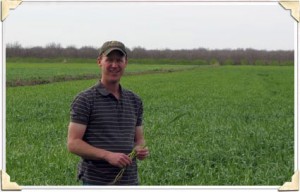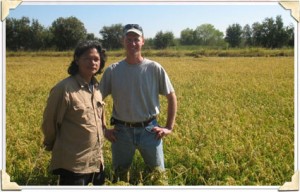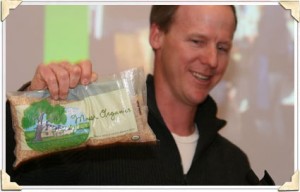Hamilton City, CA
Greg Massa is a fourth generation rice farmer and president of Rice Producers of California. He and  his wife Raquel manage Massa Organics, selling organic whole grain brown rice to local markets around northern California. Greg is also an active voice in the Farmer to Farmer Campaign on Genetic Engineering, a group launched with the help of Farm Aid in 2001 to inform family farmers and consumers about the financial, environmental, and health implications of genetic engineering and to stop the further introduction of GE crops in the marketplace.
his wife Raquel manage Massa Organics, selling organic whole grain brown rice to local markets around northern California. Greg is also an active voice in the Farmer to Farmer Campaign on Genetic Engineering, a group launched with the help of Farm Aid in 2001 to inform family farmers and consumers about the financial, environmental, and health implications of genetic engineering and to stop the further introduction of GE crops in the marketplace.
Greg Massa knows his customers.
While this may seem like a given, for most rice farmers it’s not really an option. In fact, many never get a chance to taste the grains of their labor, as rice is generally sold in bulk, sent in even larger loads to a mill for hulling, and then widely distributed, often to overseas markets. This commodity chain makes it tough for a rice farmer to meet their customer, let alone get any feedback.
Still, Greg underscores the importance of understanding his customers’ demand; and when it comes to genetic engineering, he’s done his homework. As president of Rice Producers of California, Greg was a driving force in the group’s recent efforts to survey California’s top export markets about their willingness to buy genetically engineered rice. The result: even if GE rice was cheaper and government approval was guaranteed, no one was interested.
Unlike corn, soy, wheat and cotton, GE rice has not yet been approved for commercial production in the United States, and is currently only being grown in trial plots. However, Greg and his fellow rice farmers know all too well the dangers of such experimentation, as evidenced by the Bayer Liberty Link scandal in 2006, when a small GE trial plot growing herbicide-tolerant rice turned the entire US Southern long-grain rice market on its head. Over 40% of long-grain rice grown in the United States was found to be contaminated with Liberty Link genes, resulting in major importers closing their markets overnight, a more than $1 billion blow to the industry, and shaken consumer confidence that has yet to be restored.
While this incident was contained to long-grain rice varieties, grown predominantly in Arkansas and surrounding southern states, California’s medium-grain rice markets weren’t immune to the fallout. Greg explains: “whether the risk of contamination is real or perceived, the markets react.”
Understanding his customer’s demand for GE-free rice, Greg sees it as his responsibility to help California’s rice industry remain economically viable by protecting it from GE contamination. As a fourth generation farmer and trained ecologist, Greg is also concerned about preserving his family’s heritage and the rich biodiversity of their land.
 In a recent essay for The Ethicurean, Greg writes: “…the problem is that there is no way to contain the genes that get inserted into a [GE] crop plant. Through nature’s mechanisms of cross pollination and seed dispersal, or simply through human error, the genes spread. They can contaminate food crops with things you don’t want in food – say, for example, human saliva proteins masquerading as anti-diarrheal drugs” (a reference to a real threat posed to rice producers by the biotech firm Ventria Bioscience in 2003).
In a recent essay for The Ethicurean, Greg writes: “…the problem is that there is no way to contain the genes that get inserted into a [GE] crop plant. Through nature’s mechanisms of cross pollination and seed dispersal, or simply through human error, the genes spread. They can contaminate food crops with things you don’t want in food – say, for example, human saliva proteins masquerading as anti-diarrheal drugs” (a reference to a real threat posed to rice producers by the biotech firm Ventria Bioscience in 2003).
While the majority of rice Greg produces enters the commodity market, he also serves another kind of customer living just down the road. For more than a decade, Greg and his wife Raquel have been increasing their organic acreage, and now produce over 130 acres of organic whole grain brown rice. Once the Massas tracked down a mill willing to process it in small batches, Greg and his family began selling their organic rice exclusively to local eaters at area farmers’ markets, CSAs (Community Supported Agriculture), restaurants, and grocery stores. They have even entered into the farm-to-school  movement, acting as the sole provider of rice for the Berkeley Unified School District. Greg’s local customers probably don’t know how good they have it, but Greg certainly does. This type of direct transaction is such a rarity that Massa Organics may be the only farm in the country offering organic rice straight to the customer. And, Greg may be one of the very few lucky rice farmers who can truly say he knows his customers.
movement, acting as the sole provider of rice for the Berkeley Unified School District. Greg’s local customers probably don’t know how good they have it, but Greg certainly does. This type of direct transaction is such a rarity that Massa Organics may be the only farm in the country offering organic rice straight to the customer. And, Greg may be one of the very few lucky rice farmers who can truly say he knows his customers.
To learn more about the risks and regulation of genetic engineering, check out Farm Aid’s fact sheet and this month’s Ask Hilde column. To do something about strengthening the regulation of GE crops, submit a public comment to USDA regarding their recently proposed rule or consider making a donation to Farm Aid to help support our ongoing work on the issue.



